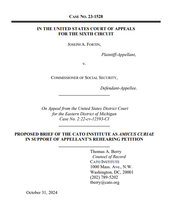The Federal Vacancies Reform Act (FVRA) is one such statute that vests appointments in “the President alone.” Specifically, it grants the president authority to unilaterally appoint temporary, time-limited “acting officers” to fill vacancies in positions that normally require Senate consent.
When President Trump took office in January 2017, the acting commissioner of the Social Security Administration (SSA) resigned. A new acting commissioner, Nancy Berryhill, then purportedly took office. But President Trump did not select Berryhill to be acting commissioner. Rather, Berryhill was elevated pursuant to a Succession Order issued by outgoing President Obama the previous month, which named and ranked positions (not people) within SSA to fill potential future vacancies in the office of commissioner.
Plaintiff Joseph Fortin later challenged an action that Berryhill took as acting commissioner, arguing that Berryhill was not validly serving under the terms of the FVRA when she took the action. But a panel of the Sixth Circuit Court of Appeals ruled against Fortin, holding that Berryhill was validly appointed by former President Obama as acting commissioner under the terms of the Succession Order. The panel held that even though Obama was not the president when Berryhill was elevated, the order that Obama issued carried over to the Trump administration and remained in effect because Trump had not revoked it. The panel also held that Berryhill’s designation did not violate the Appointments Clause because she did not need to be “appointed” as an acting officer and was merely assigned new duties.
Fortin is now asking the Sixth Circuit to rehear his case, and the Cato Institute has filed an amicus brief supporting his petition. In the brief, we argue that acting officers must be “appointed” per the terms of the Appointments Clause and that Berryhill’s elevation via Succession Order was not an “appointment” under the meaning of the Constitution.
In The Federalist Papers, Alexander Hamilton explained that because the president alone would be responsible for choosing nominees, “The blame of a bad nomination would fall upon the President singly and absolutely.” But if an appointment is made by contingency order rather than by name, then the accountability mandated by the Appointments Clause vanishes. The people cannot blame President Obama for Berryhill’s performance, because Obama did not choose Berryhill for the position. Indeed, the people cannot blame any single person for Berryhill’s accession to the position of acting commissioner, because her accession resulted from the combined actions and inactions of no fewer than four people. That is precisely the diffusion of accountability that the Appointments Clause forbids.
The Sixth Circuit should rehear this case to address these serious Appointments Clause concerns. When there is no clear line of accountability for a nomination, political accountability suffers. Requiring the president to take accountability for federal officers by actually naming those officers is not too much to ask.


